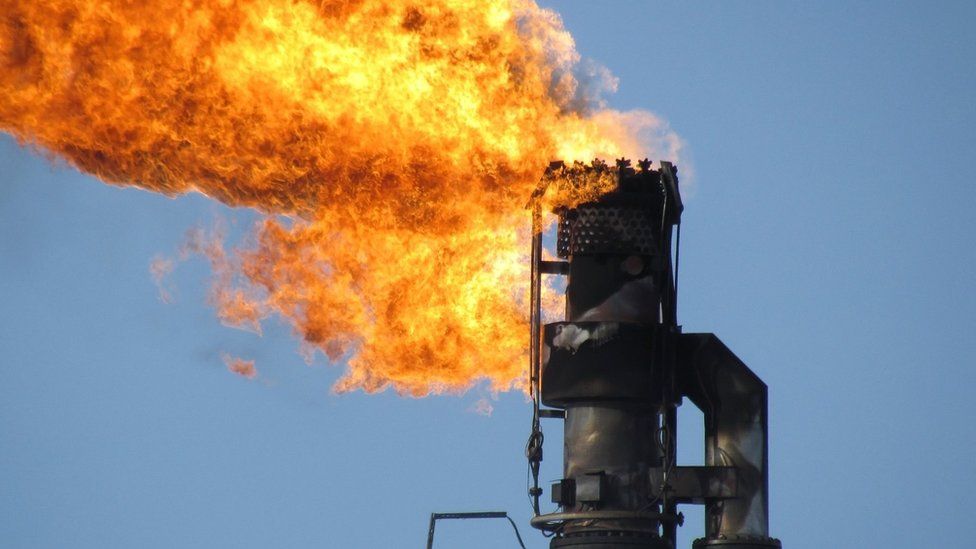ARTICLE AD BOX
 Image source, Getty Images
Image source, Getty Images
The test case could have implications for the future of fossil fuel exploration in the UK
By Georgina Rannard
Climate and science reporter
A Surrey woman will take her fight over a local oil drilling permit to the Supreme Court on Wednesday in a challenge that could spell the end of new fossil fuel projects in the UK.
Judges will decide whether permission for oil extraction in Horse Hill was legally granted.
Sarah Finch is challenging the drilling of four oil wells on climate change grounds.
Surrey County Council told BBC News that it followed planning law.
Ms Finch is bringing the case against Surrey County Council on the grounds that it did not consider some climate impacts of burning the oil when it granted planning permission. Environmental lawyers say the landmark case could affect projects nationwide.
The climate impacts in question - called 'downstream emissions' - are the greenhouse gas emissions released when the oil is used. Ms Finch says these are estimated to be 10 million tonnes of carbon dioxide over 20 years.
One airline passenger on a return trip from London to Boston, US emits around one tonne of carbon.
"Planning authorities say that they don't need to consider the climate impacts of the actual burning of the oil - just from the drilling. It's like saying a chocolate cake is low calorie as long as you don't eat it," Ms Finch, who campaigns with local organisation Weald Action Group, told BBC News.
Greenhouse gases like carbon dioxide trap the sun's heat in the atmosphere, causing the planet's temperature to rise.
"The County Council is required to determine planning applications in accordance with the Development Plan, the National Planning Policy Framework, national policy and other material considerations, as set out in legislation and case law. The Horse Hill planning application was determined on this basis," a spokesperson for Surrey County Council said.
Image source, Bryn Truscott
Image caption,Sarah Finch has campaigned against the oil wells at Horse Hill since 2012
Ms Finch's first challenge in the High Court was thrown out. She took it to the next level, the Court of Appeals, where the three judges were split, with one upholding the appeal.
Friends of the Earth lawyer Katie de Kauwe told BBC News that carbon emissions from these projects are "being vastly underestimated".
"Developers are fighting court cases like this because they are very concerned that if decision-makers are confronted with the full carbon impacts of these projects, so with downstream emissions added, then they might think twice about granting them planning permission," she added.
Ms Finch's solicitor Rowan Smith said: "It's difficult to overstate the importance of this case."
Image source, UKOG
Image caption,The Horse Hill site is near Gatwick
The UK government is legally committed to lowering its carbon emissions to reach net zero in 2050, meaning it will no longer add greenhouse gases to the atmosphere.
Campaigners including Friends of the Earth say new fossil fuels projects like Horse Hill undermine those promises.
New fossil fuels projects in the UK have become politically controversial. Campaigners and experts including the International Energy Agency say all oil and gas must be left in the ground if the world has a chance of meeting climate goals.
Government advisors in the Climate Change Committee say the best way to protect consumers from high energy prices is to invest in renewables not fossil fuels.
The national significance of the case is highlighted by the involvement of external groups, invited by the court to provide additional evidence.
They include the company behind a new coal mine in Whitehaven called West Cumbria Mining, as well as the Office for Environmental Protection which is intervening in a case for the first time.
Friends of the Earth lawyer Katie de Kauwe said it is highly unusual for a private company like West Cumbria Mining to make this type of intervention.
West Cumbria Mining was given permission by the government in 2021 to open the first new coal mine in the UK for 40 years.
"It is obvious that they are worried about the potential implications of the case on their coal mine," Ms de Kauwe said.
West Cumbria Mining told BBC News it did not consider it appropriate to comment on a live legal case.
The Office for Environmental Protection told BBC News it is intervening because it wants legal clarity on how decision-makers conduct Environment Impact Assessments when assessing fossil fuel projects.
The one-and-a-half day hearing begins on Wednesday. A decision from the judges could take three to six months.

 1 year ago
54
1 year ago
54








 English (US) ·
English (US) ·